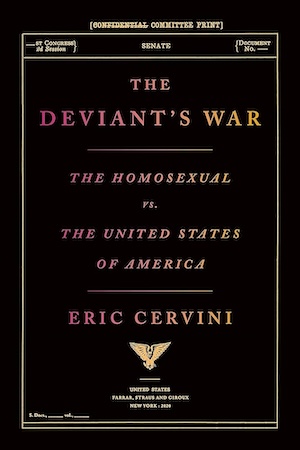 REVIEW:
REVIEW:
The Deviant’s War: The Homosexual vs. the United States of America,
by Eric Cervini
Runestone, volume 10

REVIEW:
The Deviant’s War: The Homosexual vs. the United States of America,
by Eric Cervini
Runestone, volume 10
The Deviant’s War: The Homosexual vs. the United States of America
by Eric Cervini
Macmillan
2021
512 pages
ISBN 978-1-250-79850-3
Reviewed by Max Lakso
—
I stumbled upon Eric Cervini’s The Deviant’s War: The Homosexual vs. the United States of America over the summer, during the few months of the year during which I am free from the neverending deluge of college readings. Yet, despite the book’s academic nature, I was intrigued. This biographical narrative of a queer uprising manages to be oddly relevant to contemporary America, where the culture has simultaneously become increasingly legally antagonistic towards transgender people and more involved with grassroots activism. The book was free, so I took it home, figuring that at least it would look cool to have a gay, anti-establishment book on my shelf. I soon found myself utterly hooked on the narrative within.
This historical account follows the progression of Frank Kameny—a homosexual astronomer blacklisted from government work in the 1950s—from his interrupted existence as a private individual, to his outing and ostracizing, to becoming the principled and unabashed leader of a queer rebellion. We watch Kameny’s journey from its humble beginnings in a public restroom, where a fleeting moment of intimacy is secretly surveilled, to self-represented legal battles, romance and roommates, wars and McCarthyism, the early days of pride parades, starvation and poverty, advocacy group infighting, and more. It all combines into the story of Frank Kameny’s righteous struggle to convince the government and society alike that not only should no one be barred from government service for their sexuality, but that (in his words), “Gay is good.”
In his debut book, awarded LGBTQ+ historian Eric Cervini masterfully weaves a main plot centered in the second half of the 20th century with historical context stretching from 1901 in Russia to modern America, allowing readers with no prior knowledge to fully understand each event and its implications. Arguably even more importantly, Cervini has managed to structure the uncooperative jumble of history into a story, with a plotline and major and minor characters. In order to turn a collection of information into a story, the author of a biography must draw out the thematic connections between events which would not otherwise be naturally evident. By highlighting factual details from the subjects’ personal lives, the author is also able to create emotional engagement in this plot without deviating (no pun intended) into historical fiction by excessive speculating. All of these factors are tied together with a consistent voice which proves both subtle enough for biography, yet clever, emotive, and rhythmic as to keep a reader entertained by what could otherwise be a dry, factual recounting of history.
Despite Cervini’s talent in crafting compelling prose, this book is still very much committed to conveying its research and knowledge, as made clear by the over 80 page section of references and footnotes at the back. As such, it can be very information-dense. It took me longer to read one page of this than it might take to read an average entertainment-focused book of similar font and spacing. It occasionally dragged in pace as well, particularly while discussing the minutia of various advocacy networks’ inner political workings, alliances, and disbandings. This is difficult to avoid while accurately conveying a historical timeline, particularly one involving politics, and it may lead some readers to disengage.
Yet even in the more tedious fastidious sections, I felt a pull to keep reading. In part, it was the graceful and clever sentence-level writing that allowed my eyes to flow across the page. It also had something to do with the fascinating plot threads of sexuality, surveillance, and government secrets that drive this real-life drama. But mostly, I found myself incredibly invested in this astronomer who was born over half a century before me and passed away when I was nine. I felt an emotional stake in learning about the life of this man who made America freer, safer, and more accepting for myself and others in the LGBTQ+ community. This queer elder, previously unknown to me, has finally received his honors after years of being left out of the picture. His story is not just about one man, but about learning the power of pride and the people. In short, I would heartily recommend this book to history buffs, queer young adults looking to learn our history, political drama aficionados, activists, allies, academics, anyone who loves an underdog story, and anyone who needs a little hope that change is possible.

Maxwell Lakso
Hamline University
MAXWELL LAKSO (or just Max, to those who know him) is a junior undergraduate at Hamline University with a major in psychology and a minor in creative writing. As an editor and reader, he has a soft spot for unique (and concise!) forms, clarity balanced with eloquence, and joy as rebellion. Maxwell is a queer and disabled writer of poetry and creative nonfiction, and plans to someday put out a chapbook. He delights in collecting strange and wonderful words in an ever-expanding list in his notes app.

